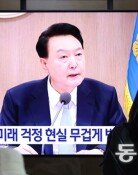Water Treatment
Opposition parties such as the main opposition Democratic Party and the progressive Democratic Labor Party are determined to use the July 28 by-elections as an opportunity to judge the four-river restoration project. In a meeting with the chiefs of opposition parties Monday, Democratic Party leader Chung Sye-kyun said, The people showed a yellow card to the four-river project in the June 2 local elections. We must show a red card in the upcoming by-elections.
The core of the project is water treatment and securing water resources. The Yeongsan River, which is prone to flooding because the bottom is higher than nearby land, no longer sees flooding under heavy rainfall because the soil at the river bottom has been dredged as part of the project. The damage to regions near the four rivers is an estimated 1.5 trillion won (1.2 billion U.S. dollars) per year and costs 2.4 trillion won (1.9 billion dollars) to repair. Over a decade, as much as 24 trillion won (19.7 billion dollars) was spent. If 22 trillion won (18.1 billion dollars) is spent to complete the four-river project, fears over flooding and drought would disappear. Is this something to be objected without reason?
Those opposed to the project also criticize building weirs, saying they also kill rivers. Korea has a lot of rain in the moonsoon season and water flows into the sea. In times of drought, rivers show their bottoms. To secure water sources, which are directly linked to quality of life, dams and weirs need to be built. Todays weirs are not made of cement but of movable weirs that go up and down. Since they drain water from the bottom, water does not decompose.
The Han River, where submerged weirs were built in 1986, has seen an increase in the number of fish species from 24 to 71. Back in 1986, 88 percent of the slope of weirs was concrete. With the development of environment-friendly technologies, only six percent is concrete and the rest made of wood and grass. The banks of the river has also turned into a waterfront where residents rest on hot summer nights and enjoy water sports.
The Democratic Party should think seriously why South Jeolla Province Gov. Park Joon-young, a party member, and province residents strongly favor revival of the Yeongsan Rivers restoration project. If the party just wants to object to attract votes in thinking that the government will pick up the slack for the black and smelly river, then it has no business taking power or being an alternative party.
The government and the Office of National River Restoration should inform the people of the right policy and aggressively refute groundless arguments by the opposition. If they believe what they do is always right and force others just to follow, government policy cannot make a soft landing. If they bring figures from religious and environmental groups that oppose the project to the site, arrange a meeting with residents who support the project, and have a head-to-head debate, opposition for oppositions sake will fade.
Headline News
- Israel prepares for retaliation against Iran
- Samsung reclaims top spot, surpassing Apple in smartphone market
- 77% of Koreans in 20s and 30s are 'Kangaroo Tribe' due to job crisis
- KBO referees embroiled in controversy over ABS decision concealment
- Inflation, oil price surge put double shock on global economy






